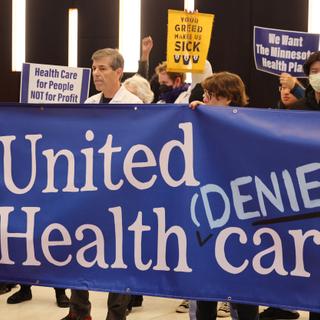


The brutal labyrinth of the American healthcare system
In DepthThe assassination in early December of Brian Thompson, the head of UnitedHealthcare, the US's leading health insurance company, has rekindled the debate over the way medical care is managed in a system that costs patients dearly.
Wall Street has been gripped by panic since the assassination of Brian Thompson, CEO of UnitedHealthcare, the leading US private insurer, by the 26-year-old son of a wealthy Delaware real estate family and a graduate of Ivy League universities, on December 4. In the aftermath, shares in private companies plunged: 14% and more for UnitedHealthcare, CVS (owner of Aetna) and Cigna. Humana fared better, with a decline limited to 5%.
In the US, this murder has resurfaced resentment against insurance companies, accused of denying or delaying paying patients' care. On Wednesday, December 12, two Congressional Senators – Elizabeth Warren, Democrat of Massachusetts, and Josh Hawley, Republican of Colorado – introduced a bill to dismantle the corporations that own pharmacy chains.
They are accused of conflicts of interest and collusion to impose high drug prices by overcharging policyholders, via their Pharmacy Benefit Managers (PBMs, pharmaceutical middlemen). "PBMs have manipulated the market to enrich themselves – hiking up drug costs, cheating employers [who fund their employees' private insurance], and driving small pharmacies out of business," said Warren. "My new bipartisan bill will untangle these conflicts of interest."
For Hawley, the new legislation "will stop the insurance companies and PBMs from gobbling up even more of American health care and charging American families more and more for less." The market is, in effect, a jungle, with prices for the same drug varying by a factor of four. A Wall Street Journal investigation cited the example of Zytiga, the generic version of a prostate cancer drug, with 2,200 different prices across the country. To find poorly reimbursed drugs at affordable prices, you sometimes have to shop around in pharmacies.
You have 83.27% of this article left to read. The rest is for subscribers only.
